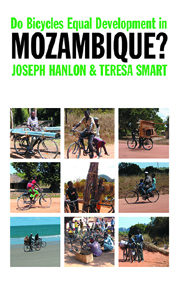Book contents
- Frontmatter
- Contents
- Acknowledgements
- The authors
- Money & measurements
- Abbreviations, acronyms & glossary
- Part I IS THERE DEVELOPMENT IN MOZAMBIQUE?
- Part II ACTORS & CONTEXT
- Part III ALTERNATIVES & THE DEVELOPMENTAL STATE
- 13 Questioning the cargo cult
- 14 Increase demand to kick-start the economy
- 15 Agriculture & the new role for the state
- 16 Finance & a development bank
- 17 The developmental state builds capitalism
- 18 Can Mozambique stop putting its hand out & become a development state?
- Appendix 1 Aid
- Appendix 2 Investment & other tables
- Bibliography
- Index
16 - Finance & a development bank
from Part III - ALTERNATIVES & THE DEVELOPMENTAL STATE
Published online by Cambridge University Press: 05 April 2013
- Frontmatter
- Contents
- Acknowledgements
- The authors
- Money & measurements
- Abbreviations, acronyms & glossary
- Part I IS THERE DEVELOPMENT IN MOZAMBIQUE?
- Part II ACTORS & CONTEXT
- Part III ALTERNATIVES & THE DEVELOPMENTAL STATE
- 13 Questioning the cargo cult
- 14 Increase demand to kick-start the economy
- 15 Agriculture & the new role for the state
- 16 Finance & a development bank
- 17 The developmental state builds capitalism
- 18 Can Mozambique stop putting its hand out & become a development state?
- Appendix 1 Aid
- Appendix 2 Investment & other tables
- Bibliography
- Index
Summary
‘The lack of a development bank and the lack of interest shown by the recently privatised commercial banks in providing credit to the rural sector have calamitous effects in the financing of development, especially for commercial agriculture,’ warned the report Agenda 2025 (Committee of Counsellors 2003: 159). Released in 2003, it was an attempt by a very broad group of 14 Mozambican opinion leaders to create a development vision for the coming two decades. Emanating from a group that represented both political parties as well as academics and bankers, it was a statement of the obvious which clearly had broad support. But it was also more subtle than the normal rhetoric about lack of credit; it included discussions about risk and guarantees and saw the need for a savings bank:
Companies need concessionary funds, as well as management support and capacity building, to facilitate medium- and long-term productive investment, something the banking sector is not ready to do.
The lack of funds for investment may be overcome by establishing a development bank, credit guarantee funds and venture capital companies, targeting productive investment involving the private sector and establishing credit lines.
Special credit lines should be reserved for activities that are currently not eligible to the banking sector for being high-risk activities. Financial transactions would support the undertaking of medium- and long-term productive investments in the sectors of agriculture, fisheries, agro-processing, manufacturing and export of goods that incorporate national added value and may generate employment.
- Type
- Chapter
- Information
- Do Bicycles Equal Development in Mozambique? , pp. 175 - 187Publisher: Boydell & BrewerPrint publication year: 2008

